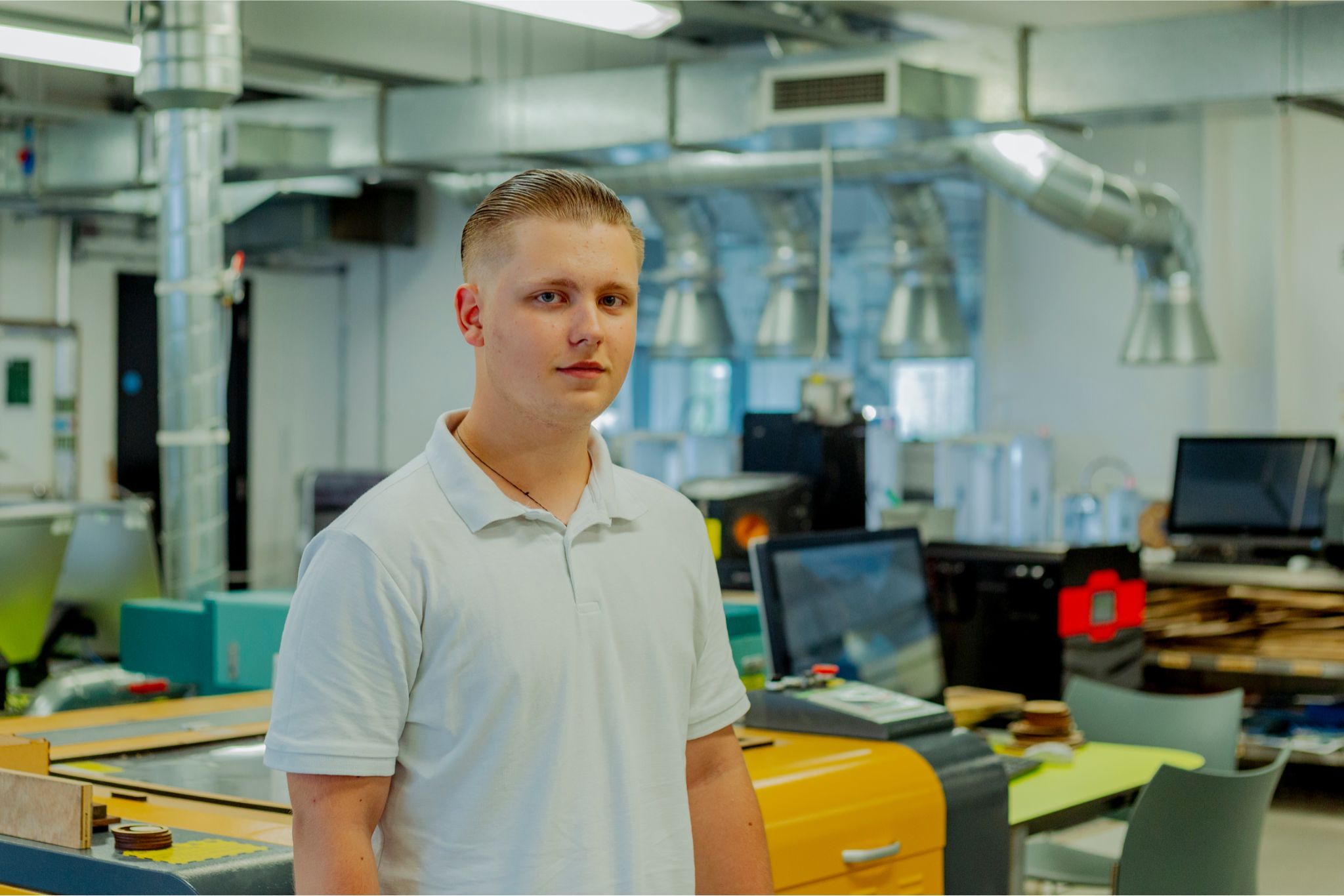
15 year-old Mykhailo in Fab Lab Plymouth
Mykhailo was born and raised in the small Ukrainian town of Kamianske, but was forced to leave his home due to the war in Ukraine. Mykhailo now lives in Plymouth with his mother, who said: “We have been sheltered by a very wonderful family in your beautiful country.”
Mykhailo has always had a passion for digital design, and began exploring the world of 3D modelling using Autodesk Fusion 360 from the age of ten. He has since taken part in numerous competitions and has been recognised for his advanced modelling skills.
Mykhailo said: “I was the winner and prize-winner of many competitions in the category of 3D modelling using CAD. I also took part in the all-Ukrainian competition for the defence of research works of students who are members of the Small Academy of Sciences of Ukraine, and won first place in the second stage.”
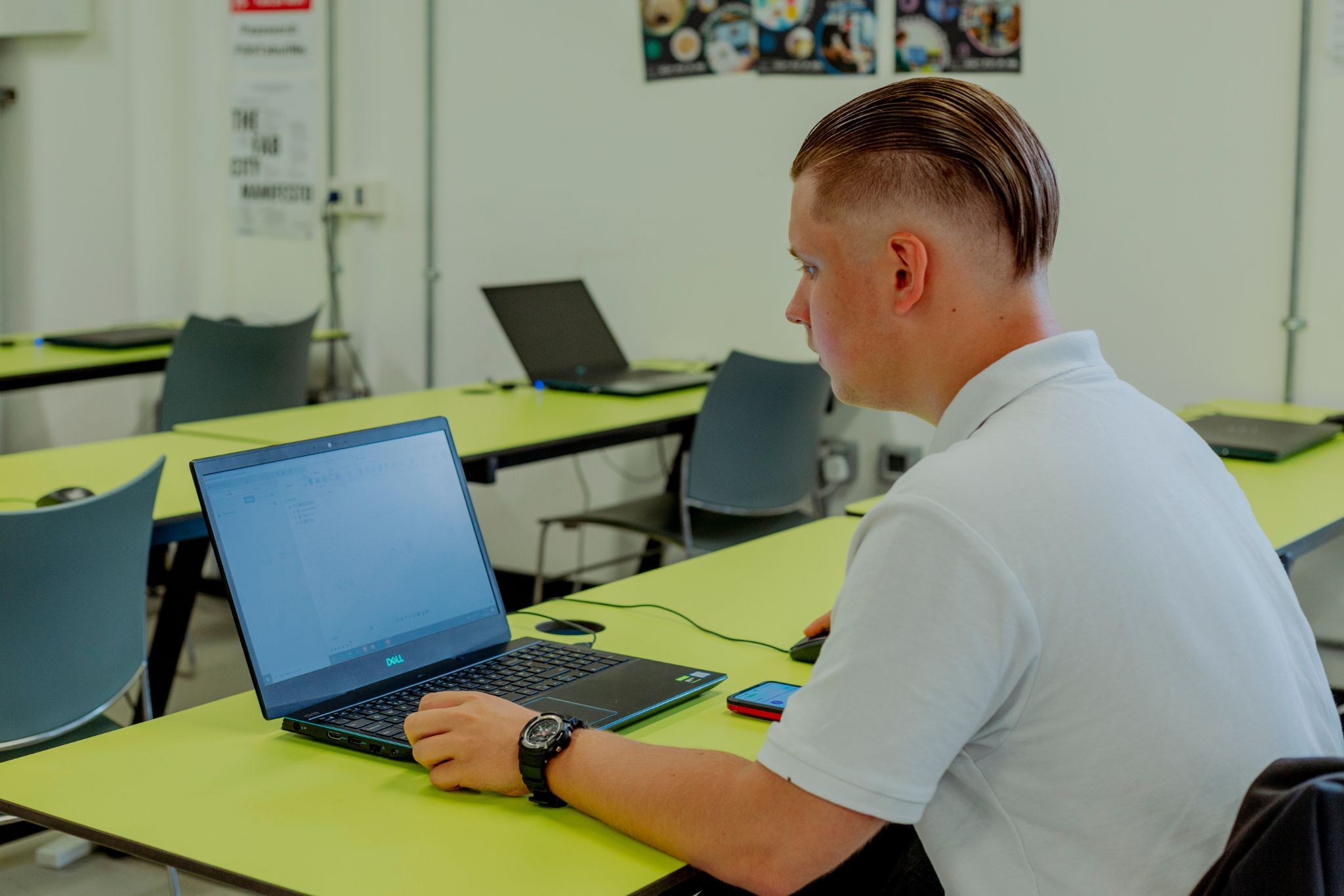
Mykhailo in Fab Lab Plymouth using Autodesk Fusion 360
Looking to further expand his skills, Mykhailo discovered the Smart Citizens Programme’s free ‘Autodesk Fusion 360 Certified User Training’ at Arts University Plymouth. This three-day intensive course, held in our state-of-the-art Fab Lab, supported participants to grow their skills in the core design principles of Fusion 360. Demonstrating the versatility of CAD, the Smart Citizens’ Fusion 360 courses have supported around 40 local businesses, people and students working across a diverse range of sectors including; manufacturing, education, science, creative and cultural.
Mykhailo said: “I really enjoyed the teaching style, and the tutors were very friendly and attentive. During the training, I learned some new features of the programme that I did not know before.”
Participants had the option to take the Autodesk Fusion 360 Certified user exam at the end of the training, to gain a formal accreditation and demonstrate their skills at an industry entry-level. Mykhailo passed the exam with flying colours, adding the ‘Certified User’ accreditation to his already impressive list of achievements, which include two other Autodesk CAD accreditations that he gained whilst studying in Ukraine.

A previous Fusion 360 model made by Mykhailo
Ben Mundy, Fab Lab Plymouth Manager and course leader, said: “During the Autodesk Fusion 360 training, Mykhailo demonstrated that his skills with the 3D design software were of a level that was advanced for someone of his age. English is not Mykhailo's first language, so the fact he completed the course and then passed the formal exam despite this language barrier was really very impressive. It was a pleasure to have Mykhailo join the course, and we are happy to have supported him on his CAD journey.”
Following the training, Mykhailo is keen to continue developing his knowledge and is excited for the future. Mykhailo said: “I would like to continue studying 3D modelling to make it my profession. After school, I dream of graduating from university having studied three-dimensional modelling and related subjects.”
The Smart Citizens Programme has been supported by The Department for Digital, Culture, Media and Sport, who fund the Cultural Development Fund, which is administered by Arts Council England.
iMayflower: How immersive technology is telling the crucial story of the life force under Plymouth’s waves
It is known as the “lungs of the sea” - the very fabric that gives life to our oceans and one of the building blocks of life as we know it on our planet.
And yet for most of us, the existence of seagrass will have barely registered.
But dive deep under the waves of Plymouth Sound and you can see breathtaking fields of seagrass, long rippling leaves giving birth to a myriad of ecosystems of plants and fish.
Its importance cannot be understated - but it’s not particularly easy to communicate.
Step forward artistic partnership Chloe Georgakis and Will Harvey, the creative design collective behind Future Meadows - a project to create an augmented reality (AR) installation that helps people understand just how crucial the life-giving ‘meadow’ of seagrass that spans Plymouth Sound is.
“Future Meadows is a project using art, design and technology to explore marine ecosystems,” explains Will. “We made an AR installation, which is a physical sculpture, and then an AR overlay.”
By hovering a smartphone or tablet device over the installation, observers can literally ‘see’ the seagrass in action and learn more about how important it is.
Chloe said: “We're leaving our sea beds bare and very vulnerable and we were looking at how we can use art and design to tell the story of seagrass - how the seagrass meadow cleans the water, how it stabilises the seabed floor, is a nursery with juvenile fish and sequesters a huge amount of carbon.”
Seagrasses are aptly nicknamed “the lungs of the sea” because they can generate enormous amounts of oxygen. A single square metre of seagrass can release as much as ten litres of oxygen a day.
In Plymouth, the city is in the middle of a four-year project led by the Ocean Conservation Trust to plant four hectares of seagrass on the bed of the Sound. It’s part of England’s biggest seagrass project.
By planting seagrass in the Sound, the project hopes to create more seagrass meadows which provide homes for juvenile fish and protected creatures like seahorses and stalked jellyfish. Seagrass also has an integral role in stabilising the seabed, cleaning the surrounding seawater and capturing and storing significant amounts of carbon.
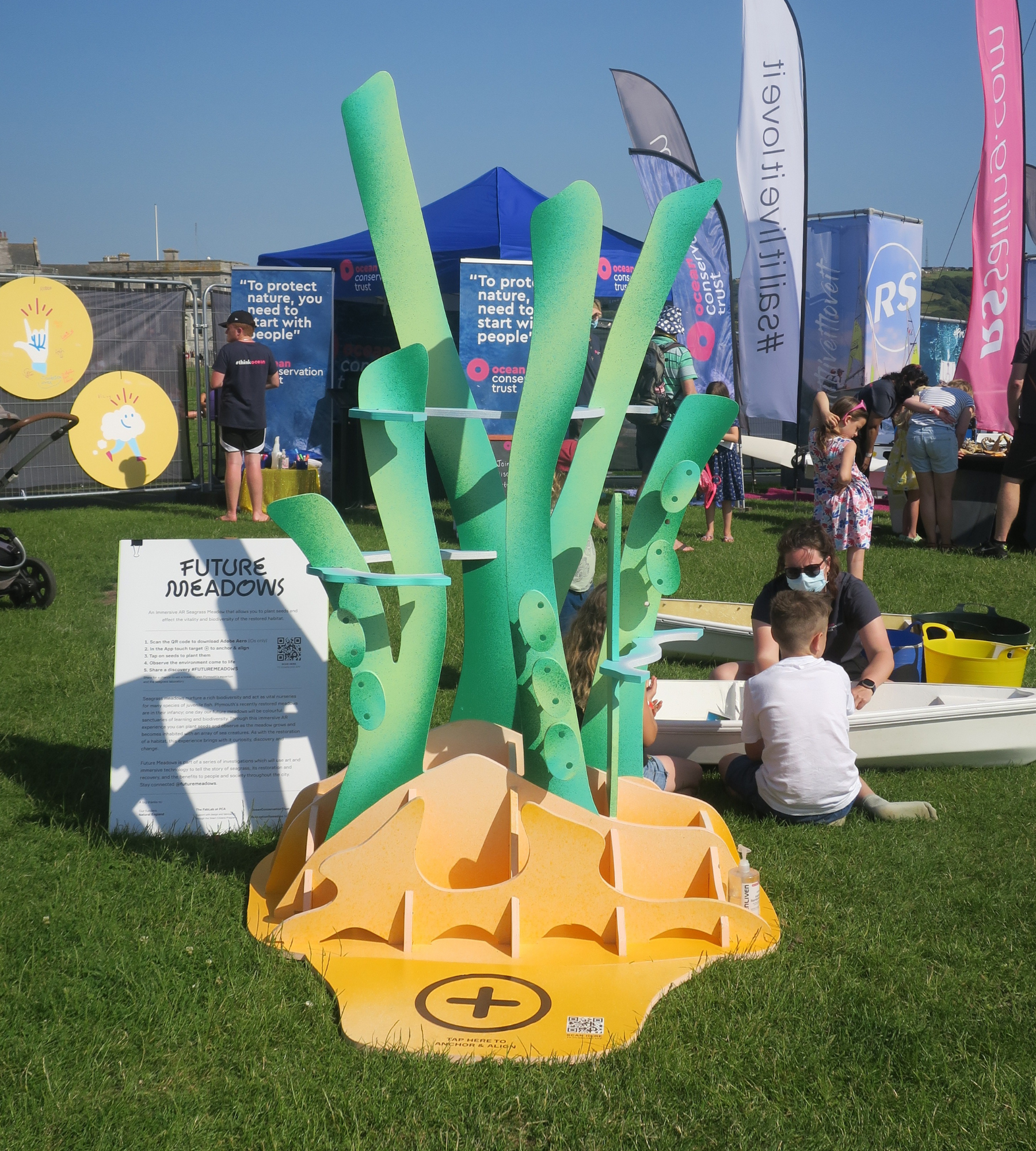
Future Meadows' AR installation at Sail GP
Chloe and Will are playing a key role in communicating the importance of seagrass. They have exhibited the installation at SailGP, the international sailing competition which drew huge crowds to Plymouth’s waterfront, and Illuminate - the annual immersive light show organised by Real Ideas, hosted this year at The Market Hall in Devonport.
“To see people interacting with the piece has been really nice,” says Chloe. “You just endlessly learn through every audience or individual that you watched participate with the piece.”
Future Meadows began life in Fab Lab Plymouth at Plymouth College of Art, where Chloe and Will took part in numerous training through the Smart Citizens Programme, including their renowned ‘Design and Make’ training, learning key skills in 3D computer aided design (CAD) and getting hands on with digital fabrication machinery, such as 3D printers.
They went on to learn more with the support of the Smart Citizens Programme and Fab Lab Plymouth - literally a fabrication ‘laboratory’ aimed at helping innovative designers and creatives - working with cutting-edge fabrication tools. It’s part of a network of 1,000 ‘Fab Labs’ around the globe, and Chloe and Will’s work has been supported by the iMayflower project, which aims to nurture creatives in Plymouth and open up opportunities for them.
They are now full-time creatives, with more inspiring projects in the pipeline, having been approached by Plymouth City Council and the LIFE Recreation ReMEDIES project to support sensitive habitats.
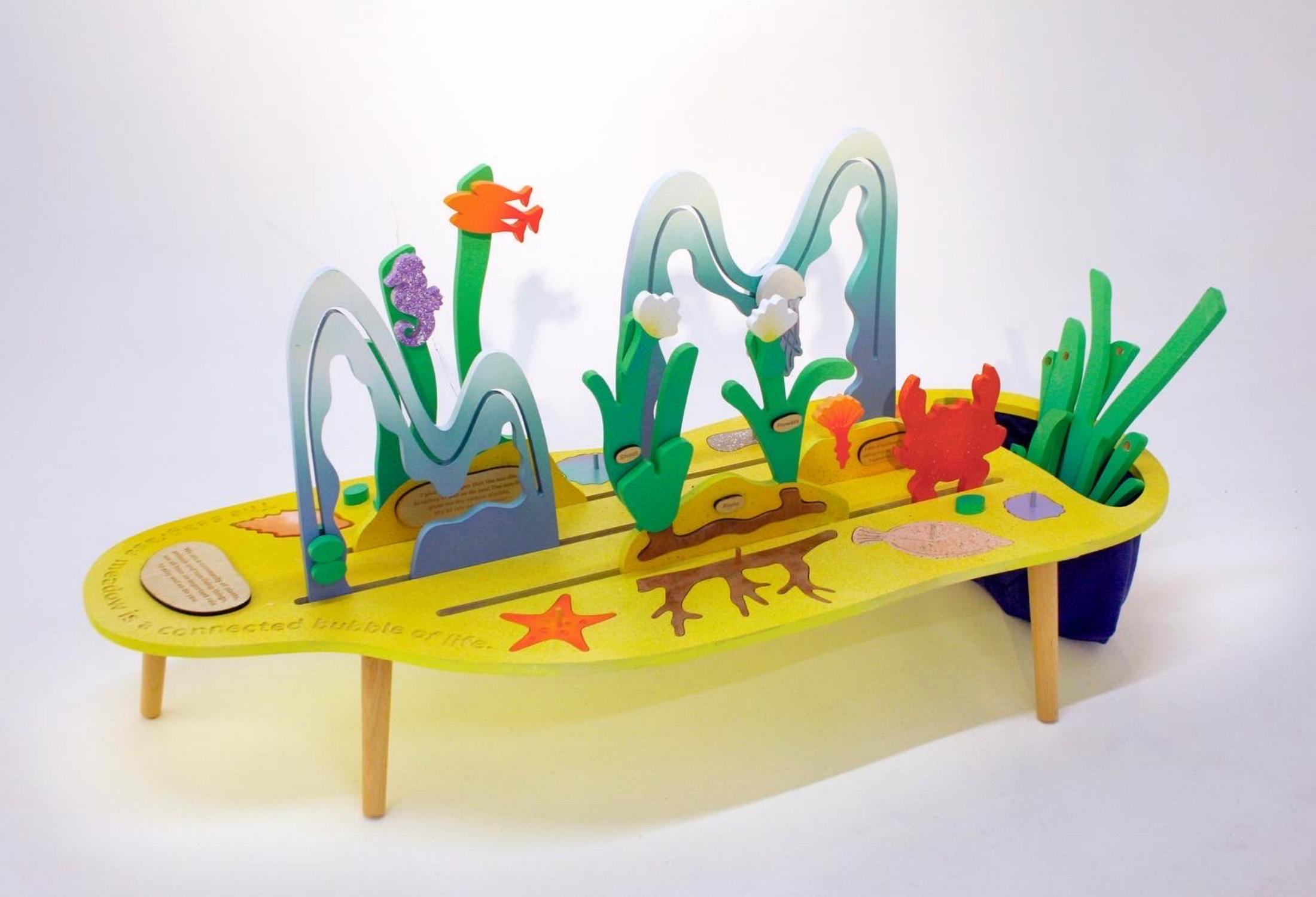
Future Meadow's Seagrass educational puzzle. Image credit: Future Meadows
Chloe said: “Now we're working on two other pieces. One is a puzzle for the children where they build a seagrass ecosystem and they play a game and learn about the ecosystem for play and activity.
“The puzzle is an educational tool that will allow the young people to understand and appreciate the values of the seagrass habitat, in a fun and interactive manner. Inviting children to build a seagrass meadow and discover its wonders and benefits through play and creativity.
“Going forward from that, we're part of the Real Ideas Start Something Immersive programme and we're really interested in looking at how we can use augmented reality, to talk about marine ecosystems and to talk about Plymouth being home to a National Marine Park.
“I think it's really important to help people connect more with nature and also to understand their place in ecosystems and their impact on them.”
Will added: “Creativity is a great tool for communicating different ideas. It's a different way for people to be able to digest quite a complicated subject that could be quite hard to otherwise comprehend.”
This activity is part of the iMayflower project and has been supported by The Department for Digital, Culture, Media and Sport, who fund the Cultural Development Fund, which is administered by Arts Council England. iMayflower is led by Plymouth City Council and delivered in partnership with Creative England, Crowdfunder, Destination Plymouth, Plymouth College of Art, the Real Ideas Organisation and University of Plymouth.
iMayflower: The laboratory nurturing the creative minds that can help us all lead more sustainable lives
It is literally a place where great ideas become physical reality.
Where digital technology - 3D printers, laser cutters and world-class scanners, turn simple concepts into something you can feel, touch and be inspired by.
Welcome to Fab Lab Plymouth, a truly innovative ‘digital fabrication laboratory’ in the heart of the city, where designers, makers and creatives can see their visions turn into reality thanks to a suite of remarkable cutting-edge tools.
It’s home to the Smart Citizens Programme, which hosts a range of free events, workshops and training in digital design and fabrication, such as 3D printing and laser cutting.
This is just one of the select locations and programmes in Plymouth where the creative community’s next generation is being nurtured, being given the skills and platform to produce urgent new work that helps us understand our world better.
Fab Lab Plymouth and the Smart Citizens Programme, based at Plymouth College of Art, sits alongside locations such as The Market Hall and Immersive Dome in Devonport and the multiple buildings at the University of Plymouth where extraordinary creative talent is being fostered.
A collaborative network of organisations in Plymouth - joined together for the iMayflower project - is working together to support this upcoming creative community and the stories it has to tell.
And those stories are ever more urgent.

Participants Kerry Brosnan (left) and Vanessa Crosse (right) with their finished solar artworks created at a workshop co-hosted by Smart Citizens and Art and Energy (Photo credit: Smart Citizens Programme)
Creative solutions to global problems
Artists and creatives have always sought to help us understand our world better and inform how we shape it.
But never before has the creative community been needed so much to communicate the drastic change taking place in our natural world, and find innovative new solutions for us to live more sustainably.
In Fab Lab Plymouth, you’ll often find work doing just that by local groups and individuals - such as Art and Energy CIC, a collective of artists, thinkers and makers specifically responding to the climate emergency.
Formed in 2018, Art and Energy worked with 20,000 people in 2021 for the mass participation installation Moths to a Flame, shown at international climate conference COP26. It involved making thousands of moths, live-streamed moth-watching, upcycled craft activities, poetry, an illustrated story book and augmented reality colouring. It was turned into a breathtaking immersive installation at the Immersive Dome for the Illuminate festival, organised by Real Ideas, in 2021.
The remarkable project, an urgent call to action about the climate crisis that touched thousands across the UK, has its roots in iMayflower.
They first connected with Fab Lab Plymouth in 2019, forming the year before and joined by Plymouth College of Art graduate and glass artist Jenny Ayrton. In November 2020 Plymouth Energy Community and Art and Energy CIC launched a campaign with iMayflower partners CrowdFunder to hold free Moths to a Flame creative activities in Plymouth throughout 2021.
Theirs was one of seven within the Plymouth Climate Challenge hosted by Plymouth City Council - raising more than £45,000 - and they also hosted workshops for local people as part of the Smart Citizens Programme, where they learned to create their own sustainable illuminated artworks. During the workshops, participants learned new skills in reverse glass painting, soldering solar cells, computer aided design and laser cutting.
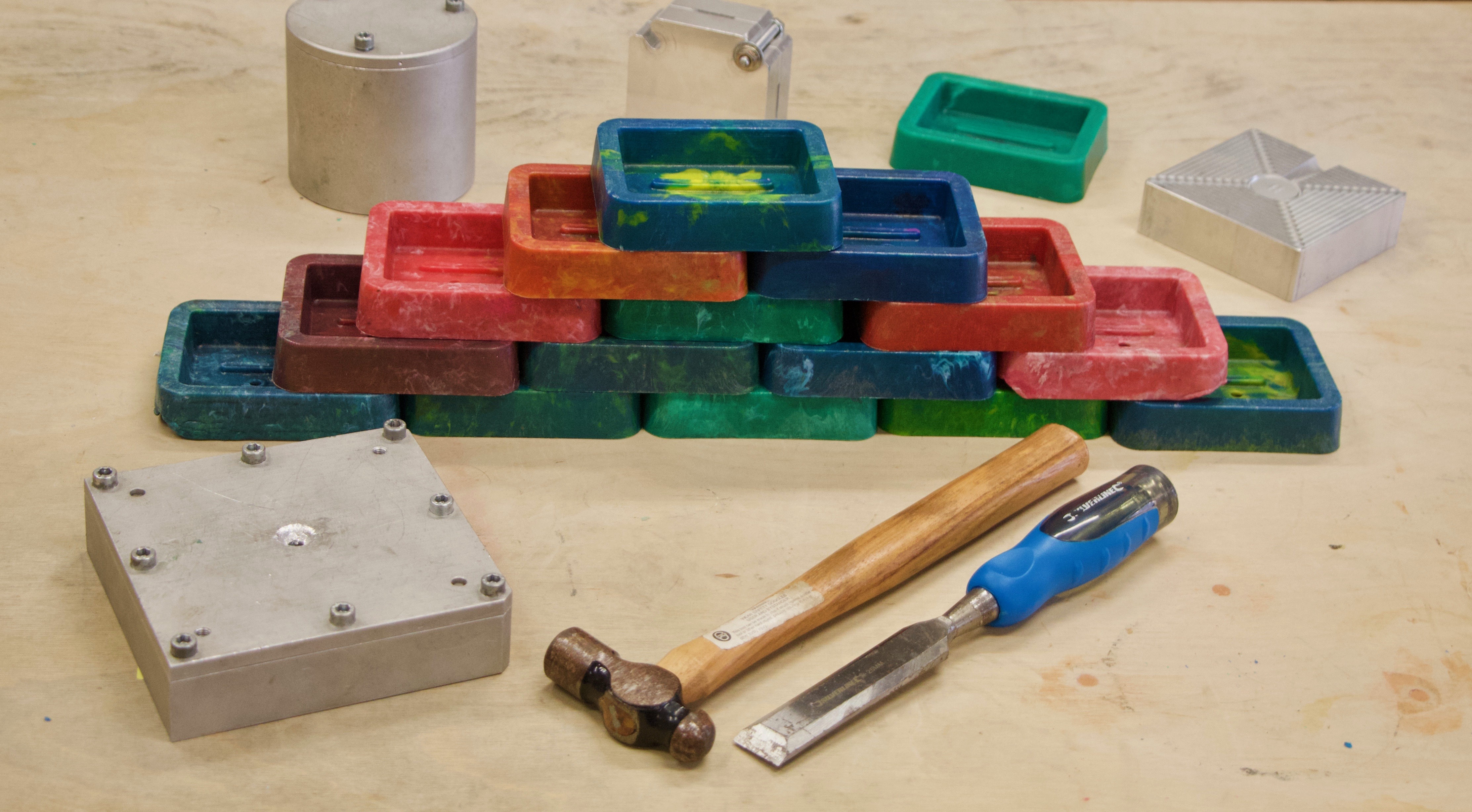
Visitors to Precious Plastic Plymouth hub at the Fab City Plymouth Open Day saw how waste plastic was transformed into soap dishes through injection moulding
Transforming waste plastic into inspiring designs
Art and Energy are just one of an array of groups benefiting from the Fab Lab and Smart Citizens Programme, as well as the network of organisations supporting creatives as part of the iMayflower project.
In 2021, more than 300 local people visited ‘Fab City hubs’ in Plymouth for an open day - led by the Smart Citizens Programme at Fab Lab Plymouth. The Fab City initiative champions local production, circular economies, digital social innovation and global collaboration and its hubs include Digital Fabrication and Immersive Media Laboratories at the University of Plymouth, and The Market Hall in Devonport.
Creative solutions for sustainability was a core focus for the day, and exhibitors included the innovative Precious Plastics Plymouth.
They began working with Plymouth College of Art back in the lockdown summer of 2020, taking part in the Smart Citizens Programme ’s renowned Design & Make training at Fab Lab Plymouth
Now, they’re shredding plastic waste to mould it into new creations, in an inspiring ‘low tech’ way. They take your old plastic and turn it into useful things such as plant pots and buttons - skills they picked up at Fab Lab, where they returned in 2021 to to run a Smart Citizens workshop using CAD to create 3D printing moulds for long-term lasting items such as soap dishes.
They’re working alongside fellow iMayflower partners Real Ideas - the Plymouth-based organisation committed to finding solutions to social change.
They have a space at Real Ideas’ Ocean Studios and have started Real Ideas’ Start Something programme for new enterprises. They’re also working with the University of Plymouth to recruit students as volunteers and collaborate with staff, while their successful Crowdfunder - another iMayflower partner - has seen them raise £20,000 to upgrade their equipment and reach new communities.
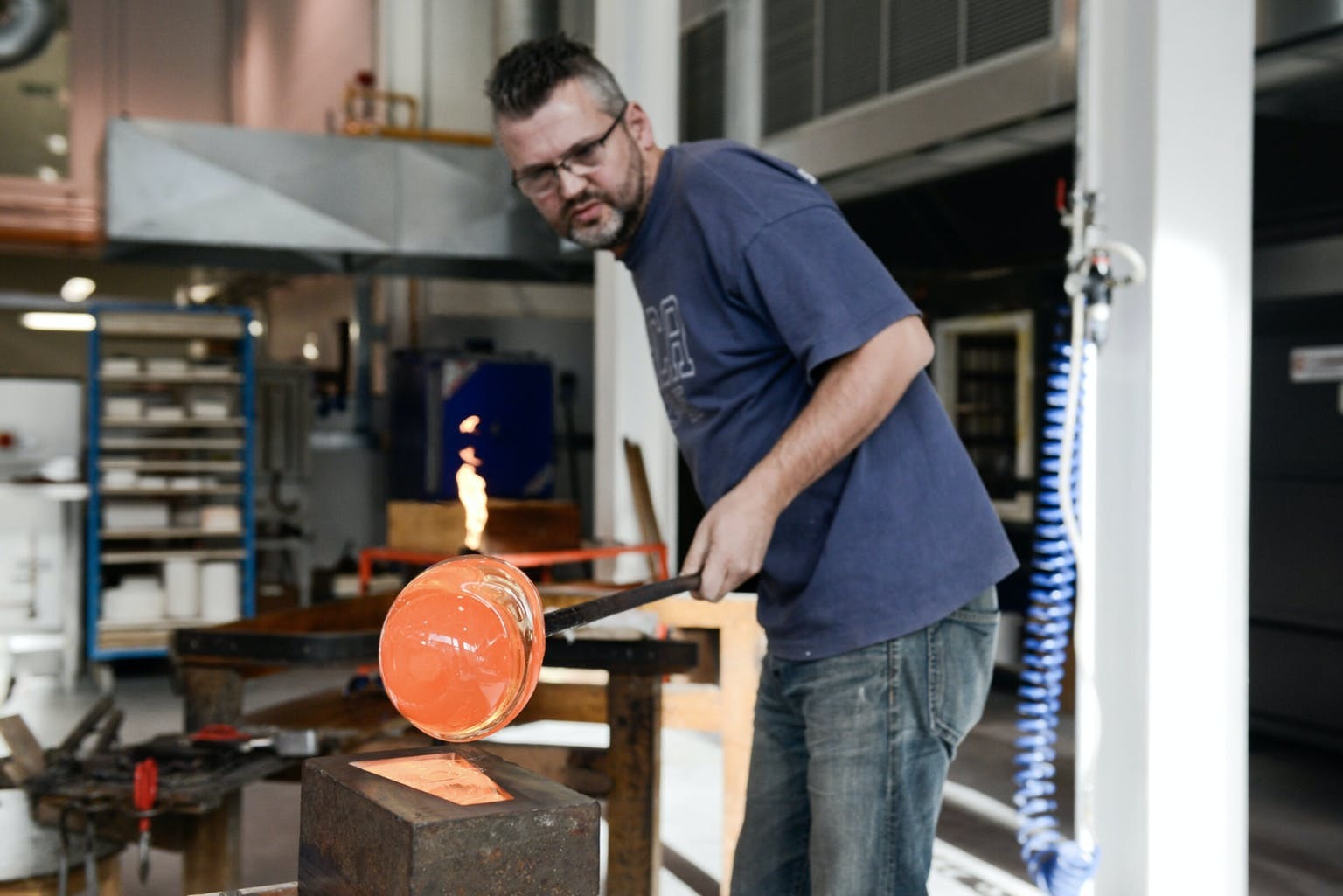
Ian Hankey blows glass at Plymouth College of Art
The sustainable glassblowing revolution
The extraordinary array of equipment at Fab Lab Plymouth has given businesses, individuals and organisations the opportunity to literally ‘make’ their visions. But without the right people to train them, these great ideas of tomorrow would still be sat in the concept stage.
Step forward the Fab Lab team, including Principal Technician and Smart Citizens tutor Ian Hankey, who embodies its sustainable ethos and collaborative vision.
After initially leaving school with no qualifications due to undiagnosed dyslexia, Ian has since developed world-leading expertise in glass, including working in the glass industry for over 40 years, from his first apprenticeship at Pilkington Glass and later managing the hot glass workshop at the Royal College of Art and managing Teign Valley Glass Studios, to his work to establish in 2014 and subsequently manage Fab Lab Plymouth at Plymouth College of Art.
Ian is also the brains behind the Upcycled Glass Company, who collect waste glass that often cannot be recycled and turn it into handmade art and design products.
They use a mixture of new technologies, modern farming methods and historical glass mixing processes that go back to the 17th century from their farm in Dartmeet on Dartmoor.
So far £10,000 has been raised via a Crowdfunder, with £5,000 more awarded by Devon Climate Challenge to create the sustainable glass blowing workshop on the moors.
Alongside his work with glass, Ian has developed his own skills in the Fab Lab, learning specific and advanced CAD CAM processes, and researching historical glassmaking processes.
Ian said: “Whether we like it or not, we’re living through a climate emergency. Everything I’ve seen and done in my life points to the fact that for every environmental problem that we solve, someone with money is going to come along and try to use that solution to create more money for themselves, undermining the positive change that could have benefited society.
“The only way to tackle societal problems of sustainability is to change the framework we’re working in and find new ways to work together. The Upcycled Glass Company CIC is my attempt to bring into the world one small part of the change that we need to live in a more sustainable way.”
The enormous challenge of raising our society’s sustainable standards and overcoming the climate crisis is overwhelming. But if a supported creative community can show us solutions founded in spaces where innovation is fostered, we stand a much better chance.
Find out more about Fab Lab Plymouth here and the iMayflower project to nurture a creative digital city here.
This activity is part of the iMayflower project and has been supported by The Department for Digital, Culture, Media and Sport, who fund the Cultural Development Fund, which is administered by Arts Council England. iMayflower is led by Plymouth City Council and delivered in partnership with Creative England, Crowdfunder, Destination Plymouth, Plymouth College of Art, the Real Ideas Organisation and University of Plymouth.